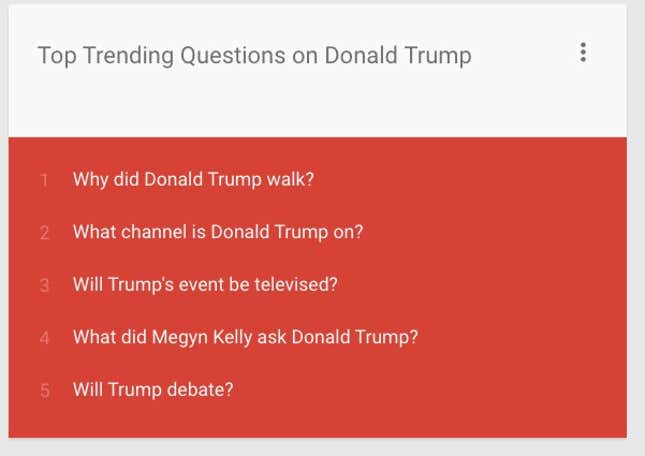Donald Trump’s latest media kerfuffle with Fox News over its anchor Megyn Kelly is just the most visible conundrum he’s presented to America’s media. Trump’s withdrawal from the Jan. 28 debate, the last before the Iowa caucuses, seems to have dragged down Fox’s ratings, which ultimately should translate to lower revenue. The digital media, however, is even more dependent on Trump.
We first noticed how Trump stories drove traffic—and thus revenue—at TheStreet.com last summer, when the name “Trump” suddenly spiked in Google searches. Traffic to stories about Trump, even if they contained no substantive new information or a comment from the candidate himself, was running some 10 times higher than that of any other candidate.
Trump interest has since continued to dominate the web. A simple glance at Google Trends shows Trump searches far outpace those for any other candidate, Democrat or Republican (a phenomenon clearly at play during the Jan 28. debate).

In revenue terms, that 10x means if a website earns $20 for every thousand page views, it can make, say, $20,000 on a Trump story, but only $2,000 on an article about Cruz, Clinton, Sanders or Rubio. Given those dynamics and the pressure on many digital media outlets to come up with content that generates page views, more and more stories are likely to be written about Trump, giving him even greater leverage over the media. Thanks to his value on the web, even the smallest items of Trump-related news gets covered.
This dynamic gets even more interesting when taking into account a digital media practice of republishing old material to boost traffic. The marginal cost of doing this is about zero; you don’t have to pay a staffer or freelance writer to write it all over again. Depending on whether any of the major tech platforms like Facebook or Yahoo pick it up, page views can match or even outstrip viewership of the original material. So most of that $20,000 drops to the bottom line.
Since only a handful of major news operations with paying subscribers can lay claim to loyal readers, most digital media operations have become completely dependent on the tech giants to distribute their content. The Trump effect is therefore further amplified by the algorithms Google, Facebook, and Yahoo use to deliver stories to individual users. In the name of personalization, the algorithms surface more content like those articles you already clicked on. So if you clicked on a Trump story once, you’ll get delivered another one. This explains why you may often find yourself looking at the same slideshow (think “10 Ways to Lower Your Blood Pressure”) again and again.
That might seem harmless enough. But when it comes to the Trump phenomenon, this self-reinforcing cycle of digital coverage now gives him real power over the whole media—just as Trump, a master marketer, intended. And he doesn’t even have to insult a Fox anchor to get it.
Janet Guyon was editor in chief of TheStreet from May 2014 to Oct. 2015. You can follow her on Twitter @jlguyon
